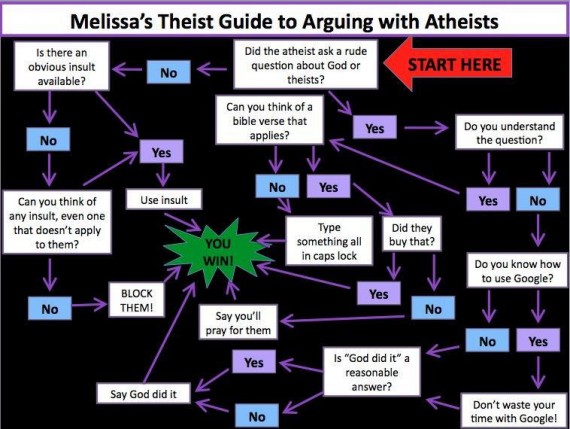Was that blog post title too provocative?
Here is something even more provocative: There is much in Christianity that is Satanic.
In fact, many elements of Christianity might make it the most Satanic religion on earth.
If you are already offended by this post, you may simply want to stop reading here. But if you keep reading, you will learn five ways that Christians worship and glorify Satan, and these five areas strike at the heart of much of what goes by “Christianity” today.

1. We Give Credit to Satan
Christians often say that one of Satan’s biggest deceptions is convincing people that he doesn’t exist.
This may be true, but I sometimes think that an even bigger deception of Satan is convincing people that he does exist, and that he is more powerful than he really is.
We Christians often give credit and glory to Satan for things which he had nothing whatsoever do with.
It is not uncommon to hear Christians “blame Satan” and pray against Satan for things that in any other person’s life, would simply be the result of poor choices, poor planning, or just poor timing.
Christians sometimes say that they are being tempted by Satan, or were sent bad dreams by Satan, or were kept by Satan from witnessing to a friend. With such ideas, Christians are attributing omniscience and omnipresence to Satan, which are attributes of God alone. Satan is a created (but fallen) being, just like you and me. He cannot be everywhere at once, and so it is nearly certain that none of us will ever have a personal encounter with Satan in our entire life. He has (in his mind) better things to do than give you bad dreams or tempt you to look at porn. The bad dream might be a result of the movie you watched, a stressful situation at work, or the anchovies you put on your pizza. The temptation to sin most likely comes from your fallen “flesh,” the part of each human which naturally pulls us toward our baser desires. In both cases, Satan has absolutely nothing to do with it.
Christians sometimes complain that Satan created problems for them at the airline customs gate or in coordinating travel plans. This is especially true if these Christians are “missionaries” who are headed to another country to “carry out the great commission.” Any problem is therefore attributed to the power of Satan. Yet these things happen to tens of thousands of “normal” travelers every day. To give Satan credit for these is to give him way too much credit.
I once talked with a woman who wanted me to cast Satan out of her car. She said that she wanted to come to church on Sunday morning, but when she got in her car, it would not start. Clearly, this must be because Satan wanted to keep her from coming to church. I told her, as gently as I could, that Satan was not possessing her car, and it would do no good for me to pray over it. More than likely, her car wouldn’t start because of some completely natural reason. Maybe her car was old, or the battery was dead. Or maybe it wouldn’t start because it had been extremely cold the night before. To give Satan credit for keeping her car from starting on Sunday morning was to give glory to Satan that he did not deserve.
Make sure that as you go through life, you don’t give credit and glory to Satan for things he has nothing to do with. Life is full of problems, and everybody has problems, and these problems do not come upon you because Satan is targeting you. In all likelihood, Satan doesn’t even know you exist, and even if he does, he’s not going to waste his time by freezing your car engine or slowing you down at the customs counter.
But this is not the only way we Christians worship and glorify Satan.
2.We Accept Satanic Offerings
 In Luke 4 and Matthew 4, Satan comes to tempt Jesus, and in the process, offers three things to Jesus, if only Jesus will worship him.
In Luke 4 and Matthew 4, Satan comes to tempt Jesus, and in the process, offers three things to Jesus, if only Jesus will worship him.
The three things Satan offers to Jesus were riches, control, and fame, and Jesus rejected all three.
Yet within 300 years of Jesus’ death and resurrection, the church had accepted and embraced all three as tools to help them spread the Gospel. But these offerings from Satan did more to hinder the message of the Gospel than help it.
Whenever Christians today chase after riches as a means to spread the Gospel, control over others as a means to manage sin, and fame or glory as a way of gaining the world’s attention, we have sacrificed the Gospel on the altar of Satanic offerings. When we do this, we not only fail to advance the rule and reign of God, but instead help advance the influence of the ruler of this age.
I wrote a lot more about this in my forthcoming book, Close Your Church for Good, and so I won’t say anything more about this point here. (Sign up for the newsletter to get a free digital copy of this book when it is released.)
3. We Diagnose Someone as Demon Possessed
I know that this point might be controversial (But which of these 5 points are not?), but I do not believe we Christians should ever diagnose someone as “demon possessed,” for doing so might actually glorify and honor Satan.
I sometimes think that we diagnose someone as “demon possessed” because we don’t want to deal with the psychological, emotional, mental, or spiritual issues that the person in question is actually dealing with. It is so much easier to write someone off as “demon possessed” than to do the hard work of loving, healing, restoring, and mending that may need to be done with someone who suffers in such ways.
But more than this, when we consider the “deliverance” ministry of Jesus in liberating people from demon possession, it is important to recognize what Jesus was, and was not, doing.
In Jesus’ day (as in ours, though to a lesser degree), people associated sickness with sin. People believed that if you sinned, one way God might punish you is by sending a sickness upon you. Therefore, if a person got sick, this was taken as an indication that the person had sinned and God was punishing them.
One of the reasons, therefore, that Jesus went around “casting out demons” was to turn this religious lie on its head. Jesus wanted to show that God didn’t punish sinners with demon possession, nor was demon possession an indication of God’s punishment or of that person’s sinfulness. The so-called “demon possessed” person was just as loved and accepted by God as anyone else.
Furthermore, what Jesus wanted to reveal was that the most demonic thing about demon possession was not the demon possession itself, but was the diagnosis of demon possession. To diagnose someone as “possessed by a demon” is to diagnose them as being outside the grace of God, underserving of His love, care, and protection, and as having been so sinful as to incur one of His greatest punishments.
But to show us that God does not send demons and that God does not punish sin, Jesus “cast out demons.” When God is truly at work, it is not to punish someone with demons or accuse them of having a demon, but to rescue, deliver, and free people from such hopeless and condemning accusations.
So to accuse someone of having a demon or of being possessed by a demon is to remove a person from the sphere of God’s grace and love, and lock them in a prison of shame, fear, and darkness, which is demonic. Therefore, to keep from glorifying Satan, we must never accuse someone of being demon possessed.
In fact, this accusatory spirit — for which we Christians are often known — is the fourth way we Christians worship and glorify Satan.
4. We Engage in Satanic Accusations
 The word “devil” in Greek is diabolos. It is built upon the Greek words dia, meaning across, and bollo, meaning to cast or throw. The devil is one who casts or throws across something. In the various contexts of diabolos, it refers to one who maligns, slanders, or sows discord and division.
The word “devil” in Greek is diabolos. It is built upon the Greek words dia, meaning across, and bollo, meaning to cast or throw. The devil is one who casts or throws across something. In the various contexts of diabolos, it refers to one who maligns, slanders, or sows discord and division.
The word “satan” is similar. “Satan” is a Hebrew word (the Greek is satanas), and it means “accuser.”
Both of these meanings are clearly seen in nearly every passage in Scripture where Satan, or the devil, is described. He accuses God of withholding something good from Adam and Eve (Genesis 3), and he accuses God of showing favoritism to Job (Job 1). In Luke 4 and Matthew 4, he accuses, challenges, and questions the mission and purpose of Jesus. The New Testament refers to him as the “accuser of the brethren” (Rev 12:10).
While God only loves, forgives, and accepts, Satan only judges, accuses, and condemns.
So when we Christians judge, accuse, and condemn others, whose example are we following? Are we more like God or more like Satan?
When we demonize our enemies so we can condemn them, we mimic Satan rather than God.
When we accuse and condemn those who we think are “sinners,” we mimic Satan rather than God.
When we sit in judgment on others, because they believe something different or behave in ways we think are wrong, we mimic Satan rather than God.
If we were to mimic God, we would love unconditionally, forgive infinitely, and accept unreservedly.
But by mimicking Satan, we worship and glorify him instead.
And this judgmental, condemning, accusing attitude leads to the fifth and greatest way we worship Satan.
5. We Commit Satanic Violence
The most Satanic thing Christians do, however, is committing violence in the name of God.
If one person murders another, this is evil.
But it is infinitely more evil when one person murders another in the name of Jesus Christ.
The same goes for war, vengeance, lust, greed, gossip, slander, and any other thing that is contrary to the character and nature of God.
When Christians go to war against their enemies in the name of Jesus Christ, we are not worshipping the God who told us to love our enemies, but are worshipping the demonic being who loves nothing more than to get us to do his bidding while blaming it on God.
We commit adultery because “God wants us to be happy.” We retaliate against our selfish neighbor because “God wants us to stand up for what is right.” We become rich on the backs of the poor because “God wants us to be wealthy.” We tell lies about others because “God wants us to share prayer requests.”
And on and on it goes.
Satan, having failed to become like God, tries to get God to become like him. And though God will never fall into such a trap, we who worship God have made God into Satan by doing what Satan wants while attributing it to God.
 The most blatant way we do this is by committing violence against our enemies and claiming that it was divinely sanctioned, that God wants our enemies dead as much as we do.
The most blatant way we do this is by committing violence against our enemies and claiming that it was divinely sanctioned, that God wants our enemies dead as much as we do.
While it is the thief who comes to steal, kill, and destroy, God gives generously to all, grants life to those in the shadow of death, and mends broken lives and damaged souls. If we are going to follow God, we will do what God does — even (especially!) for our enemies.
The Glorification of Satan
I know that this post will be somewhat controversial, but I believe that if the church is ever going to rise up and reveal to people the outrageous love of God, we must begin by jettisoning everything that looks like Satan.
I have suggested five ways we can do this above. Do you have anything to add?




 It occurred to me recently that this sort of Christian theology makes God sound like a vampire. He “bites” us, and while we continue to “look” like ourselves, we get injected with His “blood” so that we “die” but remain alive forever. As the years go by, our human nature starts to fade away, and our “divine” nature starts to show through.
It occurred to me recently that this sort of Christian theology makes God sound like a vampire. He “bites” us, and while we continue to “look” like ourselves, we get injected with His “blood” so that we “die” but remain alive forever. As the years go by, our human nature starts to fade away, and our “divine” nature starts to show through. 


 If you want to include stories and illustrations to help people understand what you are saying, this is fine to do; just don’t say you are following the example of Jesus.
If you want to include stories and illustrations to help people understand what you are saying, this is fine to do; just don’t say you are following the example of Jesus. Most “Christian” stories are too sanitized to be any good.
Most “Christian” stories are too sanitized to be any good.
 I think all of us “Christians” should stop referring to ourselves as “Christians.”
I think all of us “Christians” should stop referring to ourselves as “Christians.” The Christians of Antioch were not known for their hate, venom, judgmentalism, or religious pride, or even for their good theology, pious life, and vast Bible knowledge. Instead, They were knowing for looking and acting and behaving like Jesus Christ, and as a result, they were “called Christians” by those who were not Christians.
The Christians of Antioch were not known for their hate, venom, judgmentalism, or religious pride, or even for their good theology, pious life, and vast Bible knowledge. Instead, They were knowing for looking and acting and behaving like Jesus Christ, and as a result, they were “called Christians” by those who were not Christians.
 I walked by two guys in the store the other day who were both wearing Christian t-shirts. One was saying to the other, “Yeah, they all hate me at work, but that’s okay, because I’m standing up for Christ.”
I walked by two guys in the store the other day who were both wearing Christian t-shirts. One was saying to the other, “Yeah, they all hate me at work, but that’s okay, because I’m standing up for Christ.” If love is of God, and everybody who loves is born of God and knows God because God is love (1 John 4:7-8), then it only makes sense that love will be the prevailing characteristic of one who is born of God and know God!
If love is of God, and everybody who loves is born of God and knows God because God is love (1 John 4:7-8), then it only makes sense that love will be the prevailing characteristic of one who is born of God and know God!

